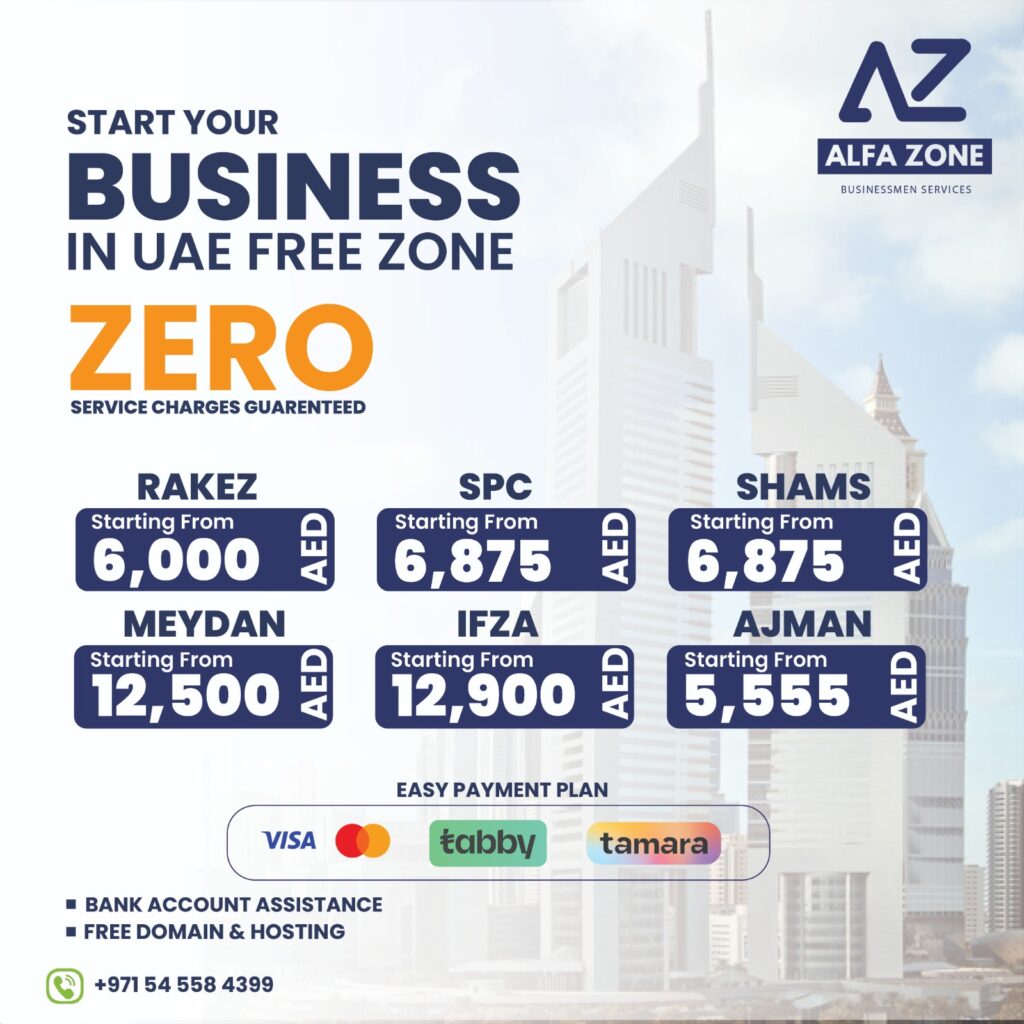10 Things to Keep in Mind While Setting Up a Business in UAE
Setting up a business in UAE has gained significant momentum over the past few decades. With its progressive economy, strategic geographic location between the East and the West, investor-friendly policies, and tax advantages, the UAE has become one of the top destinations for entrepreneurs, foreign investors, and corporations worldwide. Whether you’re establishing a Mainland Business Setup in UAE, pursuing Free Zone Company Formation, or registering a Foreign Company Branch, each business structure offers unique advantages and requirements. Navigating through the process efficiently can help you launch your venture successfully.
Table of Contents
ToggleIn this comprehensive guide, we’ll explore the essential factors to consider when setting up a business in UAE, focusing on all the key aspects and regulations. By following this guide, you’ll be well-prepared to make informed decisions and ensure your business succeeds in this thriving economy.
Check Out Our Easy Online Business Cost Calculator
1. Understand the Types of Business Structures
Choosing the right business structure is one of the first decisions you’ll need to make when setting up a business in UAE. The UAE offers several legal structures, each with specific features and benefits tailored to different business needs. Selecting the correct business structure will determine your operational scope, taxation policies, ownership rights, and market reach.
Mainland Business Setup in UAE
A Mainland Business Setup in UAE refers to companies established under the jurisdiction of the Department of Economic Development (DED) in the respective emirate. The main advantage of a mainland company is its ability to trade both locally within the UAE and internationally without restrictions. Limited Liability Company (LLC) is the most popular form of business structure for mainland companies.
A mainland Limited Liability Company (LLC) requires at least two shareholders, and it can have up to 50 shareholders. One of the most notable advantages of an LLC is that foreign investors can now own up to 100% of the company for many activities, following recent changes in UAE law. This offers flexibility for businesses seeking to operate across the UAE.
In a mainland business setup, you can also open Foreign Company Branches, allowing you to extend your parent company’s operations in the UAE. Unlike other jurisdictions, branches can conduct the same activities as their parent companies, giving them broader flexibility.
Also Read: How Much It Costs to Set Up a Business in Dubai Mainland
Free Zone Company Formation
Free Zone Company Formation is another popular option for Business Setup in UAE, especially among international investors looking for 100% foreign ownership. Free zones offer a range of incentives, including tax exemptions, zero import or export duties, and complete repatriation of profits.
The UAE has over 45 free zones spread across different emirates, with each free zone catering to specific industries and business activities. For example, the Dubai Multi Commodities Centre (DMCC) focuses on commodity trading, while the Dubai Internet City free zone is ideal for technology firms. Entrepreneurs must choose a free zone that aligns with their business goals and target market.
It’s important to note that a Free Zone Company is restricted to operating within the free zone or internationally. To trade within the UAE market, a free zone company would need to work with a local distributor or agent.
Also Read: Moving Your UK Business To Dubai

Also Read: List of all Free Zones in the UAE: A Gateway to Business Expansion
Branch of a Foreign Company
For businesses that already have an established presence overseas, opening a Branch of Foreign Company in the UAE allows you to expand your operations without having to incorporate a new entity. A Branch of Foreign Company in the UAE can conduct the same activities as the parent company and benefit from various incentives offered by the UAE government.
The primary advantage of opening a branch is that it allows you to leverage the reputation and resources of your parent company while gaining access to the UAE’s thriving market. However, branches are subject to certain limitations, such as appointing a local service agent who will act as a liaison with government authorities.
Offshore Companies
Although not as commonly discussed as mainland and free zone setups, offshore companies are another option for Company Formation in UAE. Offshore entities are generally used for international business, holding assets, or acting as a parent company to other entities. Offshore companies cannot conduct business within the UAE market directly.
Each of these business structures has its advantages and disadvantages. Your decision should depend on your business objectives, industry sector, and future expansion plans. Working with a Company Setup Consultant can help you identify which structure best suits your needs.
2. Choose the Right Business Activity
One of the most critical decisions in setting up a business in UAE is selecting the right Business Activity. The UAE government has classified business activities into different categories, each with its own set of legal requirements, licensing procedures, and fees.
Some of the most common categories of business activities in the UAE include:
- Commercial Activities: Involving trade, import/export, and general trading.
- Industrial Activities: Covering manufacturing, production, and industrial operations.
- Professional Services: Including consulting, legal services, IT services, and other professional services.
Each business activity has specific guidelines and regulations, and some may require additional approvals from relevant government authorities. For example, if your business involves food production, you’ll need approval from the UAE’s food safety authorities. If you’re providing legal services, you may need special permits from regulatory bodies.
Mainland Business Setup in UAE allows for a wide variety of business activities, giving entrepreneurs more freedom. In contrast, free zones may have restrictions on the types of businesses that can operate there. It’s important to research the allowed business activities in each free zone before finalizing your decision.
Moreover, certain activities, such as banking or insurance, require special licensing from regulatory authorities such as the Central Bank of the UAE. Hence, understanding the scope of your Business Activity is vital in selecting the correct legal structure and acquiring the appropriate license.
Also Read: Get a Grocery Store License in Meydan Free Zone Dubai

Check Out Our Easy Online Business Cost Calculator
3. Select the Right Location
Choosing the right location is another key factor when setting up a business in UAE. The location you choose will depend on the nature of your business, target market, and strategic objectives. As mentioned earlier, the UAE offers three main types of business jurisdictions: mainland, free zones, and offshore.
Mainland
For businesses that require complete access to the UAE market, a Mainland Business Setup in UAE is ideal. Mainland companies can operate freely across the UAE, take on government contracts, and engage in both local and international business.
The mainland setup is often recommended for businesses that rely heavily on local clients or need to establish physical offices in commercial areas like Dubai, Abu Dhabi, or Sharjah. In addition to this, mainland companies can also open multiple branches throughout the UAE, giving them greater reach and flexibility.
Also Read: Dubai Mainland Business Setup
Free Zones
For businesses that primarily deal with international clients or operate in industries such as technology, logistics, media, or finance, a Free Zone Company is a viable option. Each free zone has its own regulatory body and offers incentives like tax exemptions, lower operational costs, and full foreign ownership.
Some of the most prominent free zones include:
- Jebel Ali Free Zone (JAFZA): Ideal for logistics and trading.
- Dubai Multi Commodities Centre (DMCC): A leading free zone for commodity trading.
- Dubai Internet City: Focused on tech and IT businesses.
It’s important to select a free zone that caters to your specific industry, as this will allow you to take advantage of specialized resources and incentives tailored to your business type.
Offshore
An offshore company is primarily used for businesses that wish to manage their operations outside of the UAE while benefiting from the country’s favorable tax regime. Offshore companies are typically used for asset management, international trade, or holding companies. Offshore companies are restricted from conducting business within the UAE and can only interact with foreign clients.
Also Read: What is a Flexi Desk in Dubai, Its Costs & Benefits

4. Naming the Company
Also Read: Set Up a Business in Dubai and the UAE (2025)
Once you’ve decided on the business structure and location, the next step is to choose a name for your company. Naming the company is a crucial step in Business Registration as it must comply with the UAE’s strict naming conventions. The chosen name should be aligned with your business activity and must not violate any public norms or cultural sensitivities.
Here are a few important rules to keep in mind:
- The company name must not contain any offensive language.
- Avoid using the names of global organizations or well-known companies.
- If the company name contains a person’s name, it must be the full name, not initials or abbreviations.
- The name should not contain any religious references.
Once you have selected a name, it will need to be submitted to the relevant authority for approval. You’ll need to reserve your company name with the Department of Economic Development (DED) or the appropriate free zone authority. Name approvals typically take a few days, but working with a Company Setup Consultant can help expedite the process.
Check Out Our Easy Online Business Cost Calculator
5. Licensing Requirements
One of the most important steps in Business Registration in the UAE is obtaining the right license for your Business Activity. The UAE government offers three main types of business licenses, and the one you apply for will depend on your chosen activity and business structure.
Commercial License
A Commercial License is required for companies that engage in trading activities, including import/export, general trading, and other commercial operations. This license is one of the most commonly sought licenses for businesses looking to operate in both the mainland and free zones.
Professional License
If you are setting up a Business Setup Services in UAE mainland or offering consultancy services, IT services, or other professional services, you will need a Professional License. This type of license is ideal for businesses that provide specialized services rather than products.
For example, if you are starting a Company Setup Consultant service to assist others with their Company Formation in Dubai, a professional license will allow you to operate legally and provide your consulting services within the UAE.
Industrial License
An Industrial License is needed for businesses involved in manufacturing, production, or any other industrial activities. This license is suitable for factories, manufacturing plants, and production facilities. Industrial businesses may also require approvals from additional authorities, such as the UAE Ministry of Industry.
Working with a Company Setup Consultant can simplify the process of obtaining the right business license. They can assist with the application process, ensure all legal documents are in place, and liaise with the relevant government authorities to expedite the approval.
6. Legal Documents and Business Registration
Once you’ve secured the appropriate license, the next step in setting up a business in UAE is submitting the required legal documents to register your business. The documents required will vary based on the chosen business structure and jurisdiction, but they generally include:
- Application Form: Completed and signed by all business partners.
- Copy of Passports: For all shareholders and directors.
- Memorandum of Association (MOA): Outlining the structure, business activity, and share distribution.
- Local Service Agent Agreement: For foreign company branches operating in the mainland.
For a Mainland Business Setup in UAE, the Department of Economic Development (DED) is responsible for business registration. For free zone companies, the relevant free zone authority will handle the registration process.
Once all the documents are submitted and approved, you will be issued a trade license. At this point, your business is legally registered, and you can proceed with opening a corporate bank account and beginning your operations.
Also Read: Complete Guide on Business Trade License in Dubai (2025)
7. Banking and Financial Requirements
Opening a corporate bank account is an essential step in Company Formation in UAE. After obtaining your trade license, you can approach local or international banks to open a business account. UAE banks offer a wide range of corporate banking services, including multi-currency accounts, trade finance, and payroll management.
Some of the required documents to open a corporate bank account include:
- A valid trade license.
- The company’s Memorandum of Association (MOA).
- Shareholder and director identification documents.
- Proof of business activities.
When selecting a bank, consider the range of services offered, online banking capabilities, and the bank’s reputation. Working with a Company Setup Consultant can also help you navigate the bank account opening process and identify which financial institutions best suit your business needs.
Also Read: Minimum Investment to Start a Business in Dubai in 2025
8. Visa Process for Employees and Investors
The UAE offers various visa options for investors, employees, and their families. If your business requires foreign workers, you will need to sponsor their UAE residency visas. Mainland companies can sponsor an unlimited number of visas based on the size of their office and business activity.
The types of visas commonly issued in the UAE include:
- Investor Visa: For foreign business owners and investors.
- Employment Visa: For workers employed by the company.
- Dependent Visa: For family members of employees or investors.
Each visa type has specific documentation requirements, such as valid passports, proof of income, and medical fitness tests. After the visa is issued, employees can reside and work legally in the UAE.
Additionally, if you are a foreign investor setting up a Limited Liability Company in the UAE, you are eligible to apply for a long-term investor visa. This visa allows you to reside in the UAE and benefit from the various advantages offered to expatriates.
9. Complying with UAE Corporate Tax Laws
One of the main reasons investors are drawn to setting up a business in UAE is the country’s favorable tax regime. The UAE has no corporate tax on most business activities, making it an attractive destination for companies seeking to minimize their tax liabilities. However, businesses operating in specific industries, such as oil and gas, may be subject to corporate taxes.
The UAE also introduced a Value Added Tax (VAT) in 2018, applicable to most goods and services at a rate of 5%. Businesses must register for VAT if their taxable supplies and imports exceed the mandatory registration threshold.
10. The Role of a Company Setup Consultant
Finally, navigating the intricacies of setting up a business in UAE can be challenging, especially for foreign investors unfamiliar with local regulations. This is where the role of a Company Setup Consultant becomes invaluable. These professionals provide comprehensive assistance, from business registration and license acquisition to securing visas and office space.
By working with a Company Setup Consultant, you can ensure that all legal and administrative processes are completed efficiently, allowing you to focus on growing your business. Consultants are familiar with the latest regulations and requirements, and they can help you avoid common pitfalls that could delay or complicate your business setup.
Conclusion: Setting Up A Business in UAE
Setting up a business in UAE offers immense opportunities for growth, profitability, and international reach. Whether you’re interested in Mainland Business Setup in UAE, Free Zone Company Formation, or opening a Foreign Company Branch, understanding the various aspects of the process is essential for long-term success.
From choosing the right business structure and activity to navigating legal and financial requirements, each step requires careful planning and expert guidance. By following the steps outlined in this guide and working with experienced Company Setup Consultants, you’ll be well-positioned to launch your business and thrive in the UAE’s dynamic market.
Check Out Our Easy Online Business Cost Calculator
FAQs on Setting Up A Business in UAE
The steps for setting up a business in UAE include selecting a business activity, choosing the appropriate business structure, obtaining necessary licenses, and completing the business registration process.
The common business structures include Limited Liability Company (LLC), Free Zone Company, and a Branch of a Foreign Company.
Free zone company formation offers tax benefits, 100% foreign ownership, and easier access to global markets, making it attractive for many entrepreneurs.
Mainland business setup in UAE allows companies to trade directly in the local UAE market and offers greater business activity flexibility, while free zone companies are restricted to operating within their specific zones or internationally.
The required documents generally include passport copies of shareholders, a Memorandum of Association, and a completed application form for the relevant business authority.
Yes, opening a branch of a foreign company in Dubai is possible. This option allows companies to expand their international presence without establishing a new legal entity.
The time frame for company formation in Dubai varies depending on the type of business setup. It can take anywhere from a few days to several weeks, depending on the licensing and registration requirements.
A company setup consultant helps simplify the business setup process by assisting with legal documentation, liaising with government authorities, and ensuring compliance with local regulations.
An LLC in UAE is a business structure where the shareholders’ liability is limited to their shares in the company. It is one of the most popular types of business setups for foreign investors in mainland UAE.
Yes, certain business activities require additional approvals from relevant authorities. Mainland business setup in UAE is more flexible, but some activities are restricted or regulated.
Recent reforms now allow 100% foreign ownership in mainland UAE for certain business activities, but it varies depending on the type of business.
Costs vary depending on the business activity, location (mainland or free zone), and license type. Expenses generally include registration fees, license costs, office rental, and visa fees.
Free zone company formation in Dubai involves choosing the desired free zone, determining business activity, applying for a license, and completing the company registration process.
The types of licenses include commercial, industrial, and professional licenses, depending on the business activity you intend to undertake.
Yes, you can change your business activity after company formation in UAE, but it requires amendments to the trade license and approval from relevant authorities.
Yes, businesses in UAE with taxable supplies over a certain threshold must register for Value Added Tax (VAT) at a rate of 5%.
Yes, foreign companies can establish a branch office in UAE free zones, which allows them to operate under the parent company’s name and structure.
Selecting the right business activity is crucial as it determines the type of license you need and any additional approvals required. A company setup consultant can guide you through the decision-making process.
For certain types of mainland businesses, a local sponsor (UAE national) may be required. However, recent changes allow full foreign ownership in specific sectors.
When naming the company, it should not include offensive or religious words, and it should reflect the business activity. The name must also be unique and approved by the relevant authorities.
Business setup services in UAE mainland offer expert guidance, faster registration, compliance with local regulations, and assistance with licenses, visas, and office setup.
A foreign company branch is an extension of an existing foreign company, whereas an LLC is a separate legal entity registered in UAE. Branches do not have ownership shares, while LLCs do.
Business owners and employees require a UAE residency visa, which can be obtained after company formation. The number of visas you can sponsor depends on the business setup.
Free zone companies can operate internationally and within the free zone but require additional permissions to trade directly in the mainland UAE market.
A commercial license is required for trading activities, while a professional license is needed for service-oriented businesses, such as consultancies and freelancers.
You can protect your intellectual property by registering trademarks, patents, and copyrights with the relevant UAE authorities to secure your business assets.
Dubai Free Zones offer benefits such as tax exemptions, full foreign ownership, no customs duties, and easier business setup processes.
To open a corporate bank account, you need a trade license, company documents (MOA, share certificates), and personal identification documents for shareholders and directors.
Yes, company setup consultants can help with free zone company formation by guiding you through the legal processes, selecting the right free zone, and completing necessary paperwork.
Closing a company requires notifying relevant authorities, canceling licenses, settling debts, and submitting official closure documents to avoid any future liabilities.
For more information, visit Alfa Zone.
You May Also Find This Article Useful: How to Start a Food Delivery Business in Dubai
Tags:
Company Formation in UAE, Company Formation in Dubai Free Zone, Company Setup Consultant UAE, Business Activity in UAE, Branch of Foreign Company in Dubai, Business Setup Services in UAE mainland, Dubai Company Formation, Business Setup Dubai, Company Formation in Dubai, Free Zone Business Setup, Mainland Business Registration, UAE Business Opportunities, UAE Free Zone Benefits, Dubai Mainland Business Setup, Company Naming Guidelines UAE, How to Start a Business in UAE, UAE Trade License Process, Dubai Business Licensing, UAE Company Setup Requirements, UAE Investor Visa Process, UAE Corporate Tax Requirements



